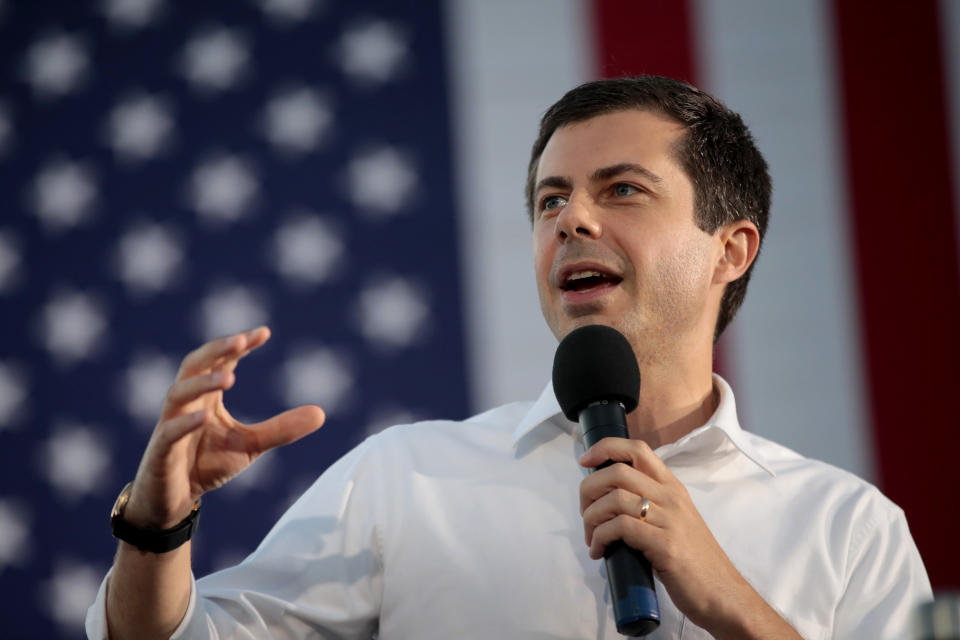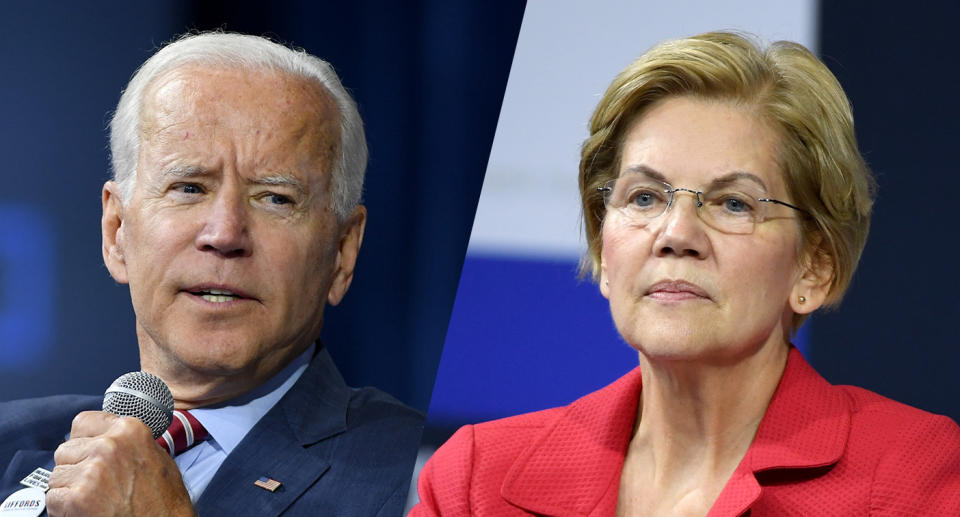Buttigieg warns of politically dangerous Medicare for All proposals
WASHINGTON — On the same November day next year when Americans will decide whether or not to keep President Trump in office for four more years, 468 members of Congress across the nation will defend their seats. And much as Democrats want to defeat Trump, they know they must retain the House of Representatives and compete for the Senate if they are to advance their agenda, regardless of who is president.
If the lower chamber were to revert to Republican control, Washington would return to the single-party dominance that Trump enjoyed during his first two years in office. Democrats managed to seize the House in 2018, in large part by running on a defense of the Affordable Care Act, President Barack Obama’s health care law that Republicans tried and failed to repeal during Trump’s first year in office.
But with the ACA settled law, at least for now, some Democrats want to go much further and get rid of private insurance altogether, putting the federal government fully in charge of the nation’s $3.65 trillion health care sector. The idea, first proposed by Sen. Bernie Sanders of Vermont and endorsed by many Democrats, is known as Medicare for All.
But with the brutal battle over the ACA in 2017 still fresh in many minds in Washington, some in the Democratic establishment think it is too soon to push for a radical expansion of the government’s power over one of the most complicated, fraught and expensive aspects of American life.
“A lot of people don’t want government insurance. I understand that,” recently acknowledged Sen. Sherrod Brown, D-Ohio, a progressive elder statesman in Congress respected for his ability to appeal to working-class whites.
In addition, there are growing worries that if the party’s presidential nominee runs on federalizing the American health care system, not only will Trump retain the White House, but Republicans will also achieve critical victories in so-called down-ballot congressional races by tethering candidates to a policy that may be far more progressive than what they support.

Republicans are eager for that very outcome. “When the caricature of a far-left Democrat is no longer a caricature, but rather their actual presidential nominee, Republicans will have a field day defining their down-ballot candidates across the country,” Republican consultant Andy Seré said last month.
Proponents of Medicare for All say that federal control of the health care sector will dramatically expand coverage and, in time, reduce costs. They cite Americans’ worries about health care costs, as well as the fact that millions lack insurance altogether, as moral and political imperatives that can no longer be ignored.
But such arguments have done little to quell anxiety among centrists. And those anxieties spiked with the release of a Monmouth poll of Democratic voters in New Hampshire, a crucial early primary state where many a campaign has been broken (and a few have been reinvigorated). The poll found that while 56 percent of respondents wanted a public option for health care, thus giving the government a far greater role in the health care system than it has today, only 23 percent endorsed Medicare for All.
That same poll had Sen. Elizabeth Warren, the Massachusetts progressive, slightly ahead of former Vice President Joe Biden. Warren has endorsed the Medicare for All plan proposed by Sanders, who was third in the Monmouth poll. He was trailed closely by South Bend, Ind., Mayor Pete Buttigieg. The support enjoyed by Warren and Sanders hardly suggests a wholesale rejection of progressive health care proposals.

Only a few years ago, Medicare for All would have been deemed not just unworkable but outright fantastic. The idea was first seriously proposed by Sanders, an independent who proudly embraces the label of democratic socialist. Warren has proposed a nationalized health care plan of her own, one similar in its outline to that of Sanders.
That leaves Biden, the current frontrunner in most national polls, and Buttigieg, perhaps the most surprising candidate in the Democratic field. At 37, Buttigieg is the youngest top-tier Democratic candidate by nearly four decades; accordingly, his campaign has emphasized a postpartisan technocratic approach that would presumably appeal to younger voters tired of left-versus-right divisions.
And it is the Buttigieg campaign that is most eager to make a substantive distinction between the more progressive universal health care proposals of Warren and Sanders and his own. The particulars of those distinctions aside, his campaign argues that most people do not want their private insurance, however imperfect, taken away. If Democrats continue to make the case for ending private insurance, the Buttigieg campaign warns, not only the White House but Congress will remain in Trump’s hands.
“Our campaign is eager to highlight why Pete’s ‘Medicare for All Who Want It’ plan is the best health care policy,” said a Buttigieg campaign staffer who could speak only if granted anonymity, “and we’re running ads right now to make sure voters understand why.”
Late last month Buttigieg’s campaign released a television commercial that sought to distance him from the primary race’s more progressive proposals on health care. The ad very simply says that under his plan, anyone could have Medicare, but nobody has to have Medicare. It ends with the following words: “The choice should be yours.”
The Buttigieg campaign staffer said that Buttigieg’s plan “would achieve universal coverage.” Not only that, it would do so “without raising taxes on the middle class or preventing every person from being able to decide what’s best for themselves and their families.”
Progressives have criticized the plan. Libby Watson, a writer for the New Republic, called it “deeply stupid,” taking acute issue with his automatic enrollment plan for people who currently lack health insurance of any kind.
For his part, Biden has generally focused on defending Obama’s signature health care plan, the ACA. Biden’s plan would, like Buttigieg’s, be a seemingly significant expansion beyond what the federal government offers today. Yet it has been criticized by his own party’s base that it does not go far enough. “Joe Biden’s New Health Plan Isn’t Just Bad — It’s Deadly,” said a headline in Jacobin, the influential magazine of liberal thought.
The Biden campaign did not respond to a request for comment from Yahoo News. Warren, like Sanders, did not respond to questions about her plan.
The Buttigieg campaign believes that it can tap into the anxieties of those who think that defeating Trump is more important than replicating the free health care systems of Canada and the United Kingdom.
The strategy is not reserved for health care alone. On gun control, Buttigieg has resisted the mandatory assault weapon buyback program proposed by his primary rival Beto O’Rourke. Buttigieg said the proposal was going to be an electoral gift to Republicans. He has his own, more moderate gun control program, one that presents as a workable product of consensus.
In making the centrist health care case, he could earn plaudits from a Democratic Party increasingly worried about what Medicare for All will do to congressional down-ballot races. That is, he could play the above-the-fray savior.
And some think one is needed. In July, the Washington Post reported that “centrist Democrats” in congressional races were dreading the prospect of running for office in 2020 with either Warren or Sanders on top of the ballot. As former New York Rep. Steve Israel explained, in “a context where Donald Trump is going to turn every idea into a socialist plot, talking about building on the Affordable Care Act is the high ground. Trying to defend Medicare-for-all becomes problematic.”
Earlier this week the Trump administration sent out a press release that called Medicare for All a “radical” plan of the left to “destroy the American healthcare system.” Trump will doubtless stoke such fears if either Warren or Sanders is the Democratic candidate.
The task of the Buttigieg campaign is to present Medicare for All as both bad policy and bad politics — and, of course, to present Buttigieg as an escape from both.
Download the Yahoo News app to customize your experience.
Read more from Yahoo News:
Hunter Biden’s work in Ukraine is a problem, but not just for Democrats
Intelligence whistleblowers face a dangerous path to Congress
Experts criticize White House use of sensitive computer system to store Trump transcripts
PHOTOS: Hong Kong protester shot and dozens arrested as Trump lauds China on National Day




